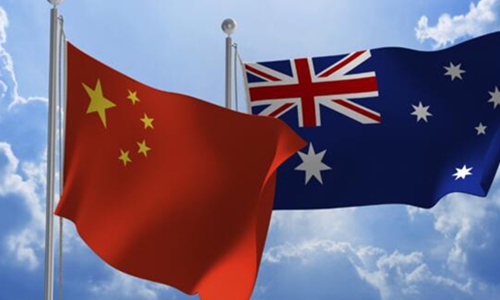‘Wolverines’ represent Washington more than Australia in antagonizing China
Source:Global Times Published: 2020/5/30 9:52:02

Photo: Xinhua
Editor's Note:
Wolverine is known as a US superhero in comic books and films. The name is also associated with the US film Red Dawn, a story about a group of high school students, known as "the Wolverines," who thwart a Soviet Union invasion. Now, a bipartisan group of Australian right-wing politicians who speak out against China in a high-profile manner has laid claim to the name. As tensions between China and Australia have been escalating for the past two years, more Australian politicians are shifting to the right. Canberra, which once tried to strike a balance between Beijing and Washington, has publicly picked sides. More unfortunately, racist attacks against Chinese and Asian communities in Australia are on the rise amid the COVID-19 pandemic. What has caused such a phenomenon? Two political experts shared their insights with Global Times.
Yu Lei, chief research fellow at the Research Center for Pacific Island Countries, Liaocheng University
Those Australian "Wolverines," including Andrew Hastie, James Paterson from the Liberal Party, and Kimberley Kitching from the Labor Party, are hardly well-known. And yet more people like them have emerged in the country's political circle in recent years and is closely connected with China-US ties.
Some people have said that Australia is the 51st state of the US, Canberra is Australia's capital, yet Washington DC is the country's decision-making body.
Although China is Australia's largest trading partner, the US is Australia's largest economic partner. US investment in Australia is much higher than China's. Americans own many of the country's mines, enterprises, and farms in Australia. American investment has also penetrated every economic sector in Australia and has had a huge influence.
From a political perspective, whether an Australian politician has close ties with the US government, the two major political parties, or the US military, is a key factor deciding whether they can become prime minister. In other words, for those who wish to be prime minister, US approval is necessary. Should an Australian politician not have US approval, and if such a person were elected, his or her term wouldn't last long. Former prime ministers Kevin Rudd and Malcolm Turnbull proved this to be correct.
Setting aside the fact that Australian national defense is almost entirely dependent on the US, with Washington's support, Canberra has enjoyed a high status in Asia-Pacific region, gaining far more interests than it's supposed to have.
Former US President George W. Bush once hailed Australia as its "deputy sheriff" in the Asia-Pacific region. In other words, the US granted Australia the authority to deal with regional issues, especially issues concerning the South Pacific island countries and Southeast Asia. This is why Australia has taken the leading role in peacekeeping and anti-terror operations in the region. Without a doubt, hegemony, even at the local level, has benefits.
Australia enjoys respect from countries in the South Pacific region, with their construction markets, investments, and fishing industries basically controlled by Australia. Ministries in those countries' governments have Australian consultants, who have a heavy influence.
That being said, when the US officially labels China as its major competitor, given China's emergence, Australia would only follow suit as a majority of its interests come from the US. Once the US loses its superpower status, Australia would lose many privileges. Should that happen, would the countries it was rude to or even bullied, seek revenge? As global power shifts, Australia is becoming more sensitive, and it believes that by only taking sides with the US can it safeguard national interests.
Against this backdrop, it is not surprising to see a growing number of politicians seeking the public's attention by clamoring their anti-China stance. After all, those who wish to become something in Australian political circles need US approval and support first.
Su Hao, founding director of the Center for Strategic and Peace Studies at the China Foreign Affairs University
There are three reasons behind Australia's rising anti-Chinese racism.
To begin with, white Australia has remained at the core of Australian national identity. The country has gradually tilted toward the US to pursue more white identity in its own society. Australia has proactively coordinated with the US' so-called Indo-Pacific Strategy. After the COVID-19 outbreak, extreme right-wing Australian politicians started following the US closely to smear China.
Second, many Australians believe COVID-19 originated in China, and they may discriminate against the Chinese because they ignorantly believe it's the Chinese people who spread the virus.
Third, Australia has always discriminated against Asians, especially Chinese. In recent decades, many Asians have immigrated to Australia, or have gone to the country to invest or for education purposes. Some Australians believe that they have occupied their resources and have pushed them out.
Australian media has been criticizing China's so-called Wolf Warrior diplomacy and yet they have spared no effort in complimenting their version of "Wolverines." This is ridiculous. Chinese diplomacy is becoming tougher because Western countries, especially the US and Australia, routinely attack China's diplomacy and economy. China has been forced to get tough.
China faces international challenges. For countries that deliberately defame China and discriminate Chinese, such as the US and Australia, we must fight back. Although China cannot eradicate Western countries' deep-rooted racism, our aid to other countries during the COVID-19 pandemic is obvious to the world. China is trying its best to promote global cooperation and yet Australia and other Western countries are instigating racial discrimination. Rational countries will eventually recognize China's positive role.
Posted in: VIEWPOINT